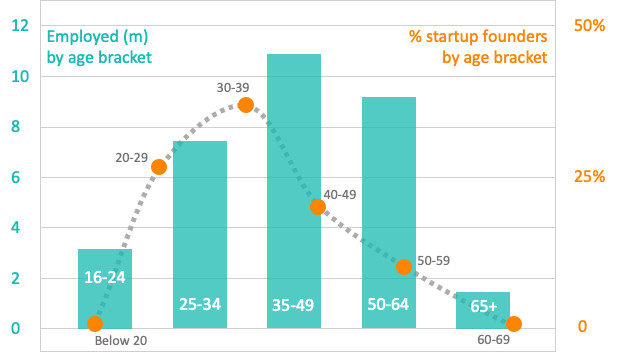Building a diverse business from the ground up
Scaling up a business allows the hard work of product development to become a properly successful business. As I have written about before, adding staff in the early days to grow a business takes founders out of their comfort zone, but being creative at this time can pay real dividends.
The average age of startup founders in the UK is 36 years, and two thirds are aged between 20 and 40. They are unlikely to have great experience in hiring team members, and even less if the roles are outside their own specialisms. That creates a temptation to stay within the comfort zone and grow volume with more of the same, rather than diversifying the team. Over time, diversity will become an essential part of workforce planning, and setting up well in the early days will pay dividends as the business grows.
Focusing for a moment on the age profile in the recruitment pool, it can be shown that startups are out of step with the general employment demographic in the UK as reported by CIPD, which shows a distribution weighted much more towards the older cohort.

The pandemic has had a harsh effect on the older workforce, with disproportionate numbers being furloughed or made redundant. This presents opportunities for growing startups if they are willing to explore them, with a pool of flexible and talented resources. Circumstances have accelerated the transition to, and general comfort with, remote and online working, and a growing trend towards part-time working and self-employment.
There are many upsides available from recruiting tech professionals over 50:
- reliability and retention – older workers are less inclined to job-jump than their younger peers, so if the fit is right, they are more likely to stay with you for an extended period
- knowledge and expertise – it almost goes without saying that if they are technically capable, then they have applied themselves to more projects and situations, and have learned from past wins and losses
- leadership and mentorship – their knowledge and experience is also available to the rest of the team, to help them to grow and improve in the often turbulent world of the startup
- decision-making – with experience comes insight, and a more considered approach to decisions
- quality networks – another product of their experience is an address book that their younger peers simply can’t match in their early careers
Older workers will still need effective on-boarding and induction, but this may not be so much as for less experienced recruits. They can bring with them critical thinking and problem-solving abilities that allow them to hit the ground running, and work on their own sooner, without the need for so much guidance and supervision. Startups have the chance to bring in experienced, capable, and valuable resources, and with a range of flexible arrangements at their disposal, the investment and commitment may be less than for younger specialists looking for a career.
Mature and substantial businesses are diverse across many dimensions. Recruiting talent that is a bit different to the traditional founder and startup profile can be a valuable first step towards building that diversity into the organisation from the very start, and hence accelerating growth.




